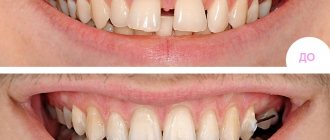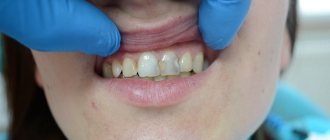Babies stick out their tongues for many reasons, and sometimes for no apparent reason at all. A child who sticks out his tongue may be hungry, full, or does not want a certain food.
Babies may also stick out their tongues to imitate or get a response from their parents. Studying your child's habits will help determine why he is sticking out his tongue.
A child's habits, awareness and ability to copy the behavior of adults change with age. Babies younger than 6 months may stick out their tongue instinctively, while babies older than this age may do it intentionally.
A baby under 6 months sticks out his tongue - reasons
For babies under 6 months of age, the most common causes of tongue protrusion are natural reflexes, hunger, and genetic differences.
Tongue thrust reflex
Tongue thrust reflex is a condition in which a child automatically sticks out his tongue in response to touching his lips. This reflex makes it easier for small babies to feed when the mother offers the breast or bottle.
The tongue thrust reflex usually lasts up to 4-6 months. Parents should not offer their baby solid foods until this reflex disappears. However, most babies do not need solid foods until they are 6 months old.
Hunger
Young children often stick out their tongues when they are hungry. The child may turn his head to one side, open his mouth, and then do the same while looking in the other direction.
Genetic condition
Congenital diseases are conditions that are present from birth. Some congenital conditions can cause a baby to have a larger-than-normal tongue. This may cause the tongue to protrude from the mouth. This is different from when a child deliberately sticks out his tongue. Children with conditions such as Down syndrome
and
Beckwith-Wiedemann syndrome
, may stick out the tongue most of the time, along with other signs and symptoms.
Genetic diseases are the least likely reason why babies stick out their tongues. In most cases, a protruding tongue is not a sign that the child has any genetic differences.
Causes
If we exclude everyday causes associated with mechanical damage to the mucous membrane of the tongue, swelling is almost always a symptom of other diseases. Therefore, you cannot delay visiting a doctor. The most common reasons are:
- Allergic reaction. Swelling can be caused by taking medications or foods that cause allergies. Typically, patients prone to allergies are aware of their problem. If you suspect allergic edema, you should consult a doctor. A severe allergic reaction can cause angioedema or angioedema. This condition develops rapidly, quickly spreading to the lips, cheeks, and larynx. The patient finds it difficult to breathe. In the most severe cases, angioedema can be fatal.
- Mononucleosis. A disease characterized by inflammation of the throat. Swelling of the tongue with mononucleosis is one of the accompanying symptoms.
- Diseases of the gastrointestinal tract. Edema develops against the background of colitis, enterocolitis, peptic ulcer, gastritis and other diseases. This reason is one of the most common.
- Hormonal disorders. For many diseases associated with hormonal imbalances, a swollen tongue is one of the symptoms.
Swelling of the tongue is not always a symptom of other diseases. Swelling often appears for everyday reasons:
- Bite.
- Burn.
- Mechanical damage (dentures, braces, poor-quality fillings, piercings, etc.).
A baby older than 6 months sticks out his tongue - reasons
At around 6 months, babies develop some communication skills, meaning they can intentionally stick out their tongue. A child may stick out his tongue to imitate an older child or adult, to get a reaction from a parent, or to signal hunger.
Imitation
Most children begin to imitate adult behavior when they are about 8 months old. However, premature babies and children with developmental delays may imitate a little later.
Getting a reaction
Children crave attention and are constantly learning about relationships with the people they encounter. A child may stick out his tongue to test the response he is getting from a particular person. If an adult laughs in response to a child sticking out his tongue, the child will do it more often. However, some children may continue to stick their tongues out even if an adult does not approve because they are curious about adults' behavior.
Hunger
Some children learn that sticking out their tongue gives them food. They can do this even when they can signal hunger in other ways.
Charging for the tongue - preventing cracked nipples
When a nursing mother experiences pain or cracked nipples as a result of improper attachment, it is not easy for her. Sometimes a mother thinks that if she weans her baby, the suffering will end. But in reality, this is not always the best way out of the situation. After all, a woman gets more tired from artificial feeding than from breastfeeding.
Relearning and honing a new skill can take days, even with the help of a lactation specialist. First of all, this is the selection of a comfortable position for latching, in which the baby himself can latch onto the breast correctly. However, there are times when the baby cannot do this right away - and I want to talk about them.
“Aggravating” circumstances include:
- Short frenulum of the tongue
- Hypo or hypertonicity of a child
- “Nipple confusion” due to bottle sucking in the hospital
In such cases , the baby may bend the tongue and not place it behind the lower gum , as is necessary for comfortable breastfeeding. The tongue rubs against the mother’s nipple or, in principle, does not protect it from the baby’s gums, and thus the notorious cracks occur.
How to help your baby make friends with his tongue?
There are simple uvula massage exercises that help your baby breastfeed more effectively and can be used during the transition from bottle to breast.
Before doing such exercises, make sure that the baby is not hungry and is in a good mood. While doing the exercise, talk to your baby and comment on your actions. It’s great if it’s some funny rhymes or songs. If your baby begins to worry, cry or ask for the breast, postpone the exercise until the next appropriate moment. Also, before starting the exercise, you must thoroughly wash your hands with soap and trim the nail on your index finger. Choose neutral soap so as not to frighten your child with the strong smell from your hands.
So, the first exercise is called “Walk on the tongue” .
It helps the baby learn to relax the tongue and position it correctly in the mouth when sucking at the breast.
- Touch your baby's cheek with your index finger. Then move your finger to the mouth. Tickle the baby's lower lip until the baby opens his mouth.
- When your baby opens his mouth, press the tip of his tongue with the pad of your index finger and count to three.
- Then, without releasing your finger from your mouth, move a little further into the tongue and press again.
- This way you can move deeper into the tongue, pressing it downwards until the child is comfortable.
- If you accidentally trigger your baby's gag reflex, try not to go that far again.
- Repeat the exercise 3-4 times if the baby doesn’t mind.
The second exercise, “Smoothing the tongue,” teaches the baby to push his tongue forward, covering the lower gum.
Many mothers, when doing this exercise, are amazed at how hard their children can suck their thumb.
- When the baby opens his mouth, insert the index finger with the pad towards the upper palate.
- Let your baby suck his thumb for about 30 seconds, while you make sure he doesn't lift his tongue away from your finger.
- Then turn your finger with the pad towards your tongue and, pressing on it, slowly remove your finger out.
- Repeat several times, then you can put your baby to your breast.
Sometimes you can immediately feel the difference when sucking the breast and even avoid surgery to trim the short frenulum , if such a problem exists. Finger feeding of expressed milk using a syringe or tube can also be combined with similar exercises.
Good luck!
+ Show hidden text
*** Joint shopping is gaining momentum, and entire social networks for shopaholics are appearing. Now this, of course, is especially important for women, because... joint purchases satisfy the great demand for lightweight women's clothing...
Sticking out tongue after feeding
There are several reasons why a baby might stick out his tongue after feeding.
Satiety signal
After eating, the child may turn his head away from food or refuse to eat. Some children try to push food out of their mouth by sticking out their tongue.
Hunger alarm
There are times when a child is still hungry even if he has just eaten. This can happen during breastfeeding if the mother's milk supply is low, or if the baby has not received enough food.
Babies of different ages may show a range of signs that they are hungry.
Children under 6 months:
- open their mouth
- smack lips
- clench their fists
- crying
Children over 6 months:
- reaching for food
- get excited by the sight of food
- crying
- use hand movements to indicate hunger
Food Dislike Alarm
Some children stick out their tongues when they don't like a new food. This is normal for children who refuse new foods.
Parents should never force their child to eat. Instead, you need to continue to introduce a wide range of healthy foods. Many children have to be given food several times before they like it.
How to correct malocclusion and tongue position.
There must be an integrated approach. Modern orthodontics offers various ways to straighten teeth. But as we have already seen, straightening teeth is ineffective without eliminating the causes leading to these changes.
Therefore, the solution to the problem of malocclusion should be aimed at the entire complex of pathological changes: restoration of the anatomically correct position of the tongue, development of the correct stereotype of swallowing, chewing, head position, posture.
Osteopathic treatment offers exactly this approach: restoration or formation of the correct relationship of anatomical structures
- Correction of weakened or excessively tense muscles of the face, neck, floor of the mouth and the tongue itself, this will lead to the restoration of the correct position of the tongue in the oral cavity and uniform participation of the corresponding muscle chains in the processes of chewing and swallowing.
- The effect on the bone structures that form the cavities of the nose and mouth leads to the restoration of the physiological volumes of these cavities and helps improve nasal breathing, chewing, swallowing and speech.
- Motor innervation of the tongue, swallowing and chewing is provided by the hypoglossal nerve, which exits the cranial cavity through the canal of the hypoglossal nerve, where in some cases it may be compressed. Until a certain age, mobility is maintained in this zone and using osteopathic methods it is possible to restore the physiological correspondence of these anatomical structures.
When to see a doctor?
A protruding tongue does not usually indicate that anything is wrong. However, some children may stick out their tongue in situations where other children would not.
You should take your child to the pediatrician if he or she frequently sticks out his tongue for no apparent reason or exhibits other developmental differences.
Any change in a child's behavior may also be a warning sign of a problem. For example, a baby who consistently shows signs of hunger immediately after breastfeeding may not be getting enough breast milk or formula. In addition, the child may have problems digesting food.
Behavioral changes that occur after a blow to the head or other trauma may signal an emergency. A child who has had an injury of any kind should receive immediate medical attention.
During the first year of the child's life, parents regularly visit the pediatrician. Parents should discuss changes in behavior and ask about signs of normal child development.
Always call a doctor if your child exhibits the following symptoms:
- constant signs of hunger, especially if the baby is breastfed
- tongue sticking out in addition to problems swallowing or
a change in behavior that has no clear cause
- signs of physical discomfort
You should go to the emergency room if your child's behavior changes significantly during or after an injury, fever, or illness.
Short frenulum of the tongue in a child
Ankyloglossia in children can cause problems with feeding, development of speech function, and development of the dental system. The severity of functional disorders in a child with a short frenulum of the tongue depends on the length and elasticity of the ligament, the place of its attachment, the length and flexibility of the free edge of the tongue.
Difficulties with breastfeeding occur in a quarter of children with a short frenulum of the tongue. In this case, the baby cannot properly latch onto the breast with his mouth, which is why the nipple latch constantly worsens or repeatedly “loses” the breast during feeding. During sucking, characteristic sounds of clicking (clicking) of the tongue appear, restless behavior, and rapid fatigue are noted. At the same time, during one feeding, the baby sucks out a volume of milk that is insufficient for saturation. The consequence of insufficient nutrition is poor weight gain, and in some cases, malnutrition.
Often mothers note that a child with a short frenulum uses his lips to suck, bites or chews the breast with his gums, compensating for the incorrect position of the tongue and trying to increase pressure on the breast. If the child exerts a lot of tension, due to muscle fatigue, he may experience jaw tremors.
The process of feeding a child with a short frenulum of the tongue becomes tiring for mother and baby, and may be accompanied by pain due to injury and cracks in the nipple. Ineffective sucking leads to lactation problems (hypogalactia) because it does not stimulate milk production. In this regard, a child with a short frenulum of the tongue is often transferred to bottle feeding or artificial feeding.
In some cases, even with a short frenulum of the tongue, the baby sucks correctly and receives a sufficient amount of milk. In such children, an anatomical feature in the form of ankyloglossia may appear at an older age, during the period of formation of speech function. A short frenulum of the tongue in a child prevents the correct articulation of sonors ([p], ([p´], [l], [l´]), plucking ([w], [z], [h], [sch]) and others sounds of upper articulation ([t], [t'], [d], [d']). In speech therapy, this condition is regarded as mechanical dyslalia. With a polymorphic disorder of sound pronunciation, the child’s speech becomes illegible and incomprehensible to others.
A short frenulum of the tongue in a child can cause dental problems: open bite, prognathia, displacement of the dentition, the formation of a diastema between the lower front incisors, the development of gingivitis and periodontitis, exposure of the necks and the formation of dental hyperesthesia.
An older child and teenager with a short frenulum of the tongue may be bothered by a cosmetic defect (V-shaped tip of the tongue), constant tears of the frenulum, excessive salivation during speech, aerophagia, snoring and sleep apnea. This problem can leave a negative imprint on self-esteem and give rise to emotional and behavioral problems that require the intervention of a child psychologist.








